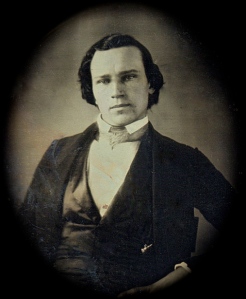
This letter was written by James Lawrence Knight (1822-18xx), the son of James Knight (1780-1841) and Elizabeth Vallotton (1781-1868). James wrote the letter to his brother-in-law, James Carver Evans (1811-1869), a son of Josiah Evans (1767-1841) and Rebecca Locke (1771-1826) of Cumberland County, North Carolina. Evans married Martha Henrietta Knight (1822-1890) in 1839; they had eleven children, including sons James Jr., Josiah, and Oliver, and daughters Larry, Cecilia, Sue Douglas, and Henrietta.
Before the Civil War, Evans was a farmer. After the war, he went into business with James Evans, Jr., running a general store. In the last years of his life, Evans wrote many essays and articles for the Fayetteville News. He died in 1869.
In this letter, James L. Knight tells his brother-in-law he thinks of going to the California gold fields but letters postmarked in Hamburg in 1851 and 1852 [at the University of South Carolina] suggest that he did not make the trip. He may be the same James L. Knight who formed a partnership with John D. Butt & Joshua W. Butt under the name Butt, Knight & Co. in Augusta, Georgia in the mid-1850s. It appears he remained in Augusta through the 1860s.

TRANSCRIPTION
Addressed to James Evans, Esqr., Fayetteville, North Carolina
Hamburg, [South Carolina]
March 13th 1850James Evans, Esqr.
My Dar Sir,It has been so long since I wrote that I fear this letter will on reaching its destination meet with a frown instead of a smile of welcome, but be its reception what it may, I can’t complain. So hoping for the best, write and send it I will.
I have been engaged the past winter in the cotton business and with some success until within the past six weeks but they have “done me up brown” and I am now nearly out of both cotton and money. I have just returned from a trip to Georgia in which I have been trying to find a better home than I consider this place to be, and think I was at half a dozen places where it is easier to make money than here, but decided on none. I came home undecided as I went and being afraid of Cotton, am doing nothing at this time, which I assure you is much more laborious than any one who has never tried it would think.
I have some serious thoughts of going to California. I am satisfied that it is emphatically the place for a poor man, and feel confident that by going there and using industry and economy I could without very bad luck return in two or three years independent. True, it would be a hard life, and there is some danger of sickness and death, but then I should not much regard the hardship for the time and as for sickness, I think with a little care, the danger there would not be much greater than at any other place I would probably go to. If I can make arrangements to suit me, I think I shall go: what do you think of it?
I saw Mother a few days ago. She is still at the old place and her health seems excellent. She speaks of coming to see you all this summer if she can get off. I have some thought of trying to pursued her to come out there to reside. I think it would be much better for her to be there with her daughters than living here alone as she is, tho’ she seems well satisfied with the life, but I am not for when I think of the way she is situated here I would agree to almost anything to have her make the change. Do you not think it would be much the best?
I have nothing of interest to write you. We have had a warm winter of it and so far the season is quite promising for an early spring. Many of the earlier fruit trees in the vicinity are blooming and the prospect for large crops this year is quite promising at this time. 3,000,000 bales cotton, grain in abundance, the Slavery Question amicably adjusted, peace and plenty everywhere, and what a grand spectacle for the contemplation of an admiring world will our Glorious Republic then present.
I am with Mr. Merry-man in his boast that we have Braver men, prettier women, larger babies & more of them, than England dare have.
I understand “the Captain” has made some change in his possessions. I hope he is doing well. When you see him, please give him my respects and express my sincere wishes for his every success and happiness. Remember me affectionately to Sister Frances and tell her to kiss the children once round for me, and my little namesake — (I will send her my daguerreotype) — a dozen times. And accept my warmest wishes for your own health, happiness, and success through life.
Sincerely your friend, — J. L. Knight



J.L. Knight appears on the 1870 census in Albany, Dougherty County, Georgia, living in a household with four of his nieces and nephews (the children of his sister Frances Knight Evans). His occupation is listed as book keeper.